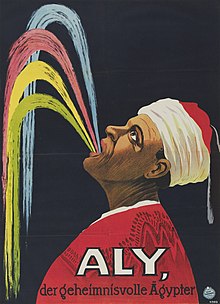Hadji Ali
| Hadji Ali | |
|---|---|

1913 Adolph Friedländer company poster; the German-language caption translates as "Ali, the mysterious Egyptian"
|
|
| Born |
Hadji Ali c. 1887–92 Khedivate of Egypt |
| Died | November 5, 1937 Wolverhampton, Staffordshire, England, United Kingdom |
| Other names | The Great Egyptian Miracle Man, The Amazing Regurgitator, The Egyptian Enigma, The Human Volcano, The Human Aquarium, The 9th Wonder of the Scientific World |
| Occupation | Vaudeville performance artist |
Hadji Ali (c. 1887–92 – November 5, 1937) was a vaudeville performance artist, thought to be of Egyptian descent, who was famous for acts of controlled regurgitation. His best-known feats included water spouting, smoke swallowing, and nut and handkerchief swallowing followed by disgorgement in an order chosen by the audience. Ali's most famous stunt, and the highlight of his act, was drinking copious amounts of water followed by kerosene, and then acting by turns as a human flamethrower and fire extinguisher as he expelled the two liquids onto a theatrical prop. While these stunts were performed, a panel of audience members was invited to watch the show up close to verify that no trickery was employed.
Although never gaining wide fame, Ali had a dedicated following on the vaudeville circuit in the United States. He performed for heads of state including Tsar Nicholas II of Russia. Judy Garland named him her favorite vaudevillian and David Blaine identified Ali as his favorite magician. Portions of his act were captured in the short film Strange as It Seems (1930) and in Politiquerias (1931), the Spanish-language version of Laurel and Hardy's Chickens Come Home. Two documentaries contain footage of Ali taken from Politiquerias: 1977's Gizmo!, and 1999's Vaudeville. Ali's unusual gastric abilities led to rumors that the Rockefeller Institute had offered a large sum of money to obtain his stomach post-mortem. After he died in England, his body was offered to Johns Hopkins University for study, though the offer was declined.
Hadji Ali was born into a working-class family in approximately 1887 or 1892, depending on the source consulted, probably in Egypt. His fame was as a practitioner of a recognized vaudeville subgenre known as a "regurgitation act", involving the swallowing of material or objects and their regurgitation in various ways. Ali became aware as a child that he possessed an unusual gastric ability. He explained in response to audience questions at a performance held at St. Mary's Hospital in Niagara Falls, New York, in May 1926, that while swimming in the Nile as a ten-year-old boy, he naturally discovered that he could swallow a large amount of water and blow it out like a whale spouting. He continued to develop and refine the ability as he grew older. A more dramatic version of these events was provided by Ali's daughter, Almina Ali, in an interview in England after his death. She stated that his abilities were first learned through a single incident: while bathing in the Nile, he inadvertently swallowed a fish and an ample volume of water. Instead of dying, as those present thought he might, Ali simply regurgitated the liquid and the fish without ill effect.
...
Wikipedia
